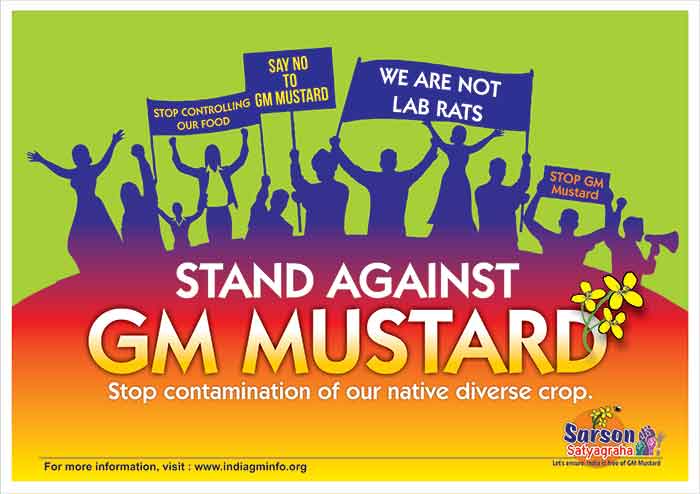
Recently the Coalition for GM-Free Agriculture in India has expressed serious concern regarding the new regulations being framed and discussed for regulating GM food as these are leaving wide gaps regarding food safety as well as feed safety. There is concern particularly regarding import of processed GM food. The consultations are being done very hurriedly without giving adequate chance for farmers , consumers, scientists and activists to give their detailed opinion regarding the proposed regulations . While demanding more time the Coalition has asked for all proposals on regulation to be made in vernacular languages as well.
Dr. Ashwani Mahajan, Co-ordinator of the Swadeshi Jagran Manch, who is even better informed about what is happening in the government at higher levels, has circulated a petition stating that the Food Standards and Safety Authority of India appears to be considering paving the way for approval to genetically modified foods and this should be widely resisted. This petition has pointed to the worldwide resistance against GM foods and argued that in view of the many scientific facts now known regarding the serious health hazards of GM foods these should never get approval.
A few years back when the strong evidence regarding the serious harms associated with the proposed introductuon of GM brinjal or Bt.brinjal were being considered by the government, seventeen distinguished scientists from Europe, USA, Canada and New Zealand wrote in a letter to the then Prime Minister of India Dr. Manmohan Singh, “GM transformation can produce novel biochemical processes that are unpredictable and for which there is no natural history to assume are safe.
“The GM transformation process is highly mutagenic leading to disruptions to host plant genetic structure and function, which in turn leads to disturbances in the biochemistry of the plant. This can lead to novel toxin and allergen production as well as reduced/altered nutritional quality.
“It is not a question of if there are disturbances to gene function and biochemistry but to what degree they will be present within any given GM plant. For example, the levels of more than 40 proteins are altered significantly in the commercialised GM MON810 corn compared to equivalent non-GM corn, which included production of a new allergenic protein.
“Numerous animal feeding studies demonstrate negative health impacts of GM feed on kidney, liver, gut, blood cells, blood biochemistry and the immune system.
“Of greatest concern is that studies show negative health effects with GM crops that have already been approved and which have been grown commercially for 10-13 years. This highlights the inadequacy of the original criteria and set of data on the basis of which marketing approval was and is still being granted.”
In the more specific context of Bt brinjal this letter stated, “Bt toxin is a proven potent immunogen raising justifiable concerns that it can give rise to allergic reactions.
“Animals fed diets containing Bt corn have shown signs of direct toxicity.
“Independent re-evaluation of Monsanto’s own research on their Bt corn crops shows negative health effects even in short-term (90-day) animal feeding studies.
“The Mahyco-Monsanto dossier of the raw experimental data of animal feeding studies with Bt brinjal shows highly statistically significant negative signs of toxicity on the functioning of multiple organ systems such as liver, kidney, blood and pancreas in all animals tested (especially rats, rabbits and goats). It is very important to note that these adverse effects were observed after only at most, a 90-day feeding time, which raises serious concerns about the safety of consuming this product over an entire lifetime. Long-term (at least 2-year) animal feeding studies were not done and are stated as not required by the apex regulator, contrary to the science, which requires these studies to detect chronic slow-onset toxicity and cancer.
“There is therefore, no scientific justification for the safety claim of Bt brinjal by India’s regulators, which are based on an uncritical acceptance of the interpretation of the data submitted by Mahyco-Monsanto. This has been heavily criticised by eminent scientists of international standing.”
Whie rejecting the introduction of Bt. brinjal after widespread consultation the then Environment Minister Jairam Ramesh had presented a wide range of very important evidence against GM food crops and GM foods, obtained among others from eminent experts.
In 2003 the Independent Science Panel, which consists of eminent scientists from many countries covering a wide range of relevant disciplines reviewed the evidence on the hazards of GMOs. This review concluded that many GM crops contain gene products known to be harmful. For example, the Bt proteins that kill pests include potent immunogens and allergens. Food crops are increasingly being engineered to produce pharmaceuticals, drugs and vaccines in the open environment, exposing people to the danger of inappropriate medication and their harmful side effects. Herbicides tolerant crops – accounting for a majority of all GM crops worldwide – are tied to the broad-spectrum herbicide glyphosate and glufosinate ammonium. These have been linked to spontaneous abortions, birth defects and other serious health problems for human beings, animals and soil-organisms. GM varieties are unstable, with the potential to create new viruses and bacteria that cause diseases, and to disrupt gene function in animal and human cells.
This report also said that there have been very few credible studies on GM food safety. Nevertheless, the available findings already give cause for concern. In the still only systematic investigation on GM food ever carried out in the world, ‘growth factor-like’ effects were found in the stomach and small intestine of young rats that were not fully accounted for by the transgene product, and were hence attributable to the transgenic process or the transgenic construct, and may hence be general to all GM food. There have been at least two other, more limited, studies that also raised serious safety concerns.
“There is already experimental evidence that transgenic DNA from plants has been taken up by bacteria in the soil and in the gut of human volunteers. Antibiotic resistance marker genes can spread from transgenic food to pathogenic bacteria, making infections very difficult to treat.
Transgenic DNA is known to survive digestion in the gut and to jump into the genome of mammalian cells, raising the possibility for triggering cancer. The possibility cannot be excluded that feeding GM products such as maize to animals also carries risks, not just for the animals but also for human beings consuming the animal products.
Evidence suggests that transgenic constructs with the CaMV 35S promoter might be especially unstable and prone to horizontal gene transfer and recombination, with all the attendant hazards: gene mutations due to random insertion, cancer, reactivation of dormant viruses and generation of new viruses. This promoter is present in most GM crops being grown commercially today.”
Several scientists involved in studying the implication and impacts of genetic engineering got together at the International Conference on ‘Redefining of Life Sciences’ organised at Penang, Malaysia, by the Third World Network. They issued the Penang Statement (PS) which stated :
“Some GEOs (Genetically Engineered Organisms) have been made with virus or transposon vectors that have been artificially enhanced to become less species-specific. Since viruses and transposons can cause or induce mutations, there is the concern that enhanced vectors could be carcinogenic to humans, domestic animals and wild animals.
“Persons with allergies may have legitimate concerns that with genetic engineering, once-familiar foods may be made allergenic. Furthermore, they will not be able to protect themselves if the foods are not labelled to state that they have been produced from genetically engineered organisms. Allergenic effects could be carried with the transgene or be stimulated by imbalances in the chemistry of the host plant or organism.
“Another problem is that field workers or neighbours may develop allergies to insecticidal transgenic crops. For example, a spider venom expressed in sugarcane might block a metabolic pathway only in insects and not in humans, but humans can nevertheless develop serious allergies to some venoms.
“With genetic engineering, familiar foods could become metabiotically dangerous or even toxic. Even if the transgene itself is not dangerous or toxic, it could upset complex biochemical network and create new bioactive compounds or change the concentrations of those normally present. In addition, the properties in proteins may change in a new chemical environment because they may fold in new ways.”
Some years back Greenpeace, Germany highlighted the results of a study from the Research Centre for Milk and Foodstuffs in Bavaria which is reported to have been “kept under lock and key for three years.” This study is important as it confirms the possibility of contamination of milk due to GMOs which exists in all countries where cattle-feed GM crops are being grown.
In addition to all this there is the ethical dilemma faced by vegetarians who may find it difficult to select food when animal genes are introduced into plant genes. The choice becomes even more difficult (and not just for vegetarians) when even human genes are introduced into food crops (even rice). This dilemma is most difficult to resolve when GM foods are not specifically labelled, and in fact GM food companies try their best to avoid any legal requirement of specific labelling of GM food.
Environmentalist Sailendra Nath Ghosh raised the very valid question whether GMO companies will compensate people for the damage caused to their health. He wrote, “The UK-based science journal Science in Society has reported that globally, cauliflower mosaic virus (CaMv) was the first plant virus found suitable to drive the expression of foreign genes in transgenic plants so much so that it is present in all genetically modified (GM) crops commercially grown today. It has also reported that this virus is hazardous for its relationship to hepatitis-B virus and the even more dreaded HIV. If this CaMv finds its way to the human cell, it multiplies and activates a number of common viruses that cause diseases including cancer. Would the corporate bodies propagating GMO, then, be liable for compensating the victims of such pandemics and mass-scale malignancies caused by deliberately engineered poisoned foods?”Clearly the issues relating to safety of GM foods are very important and these should get adequate attention instead of highly inadequate regulations being pished in a hurry, as appears to be happening just now.
Bharat Dogra is Honorary Convenor, Campaign to Save Earth Now. His recent books include Protecting Earth for Children and Planet in Peril.














































